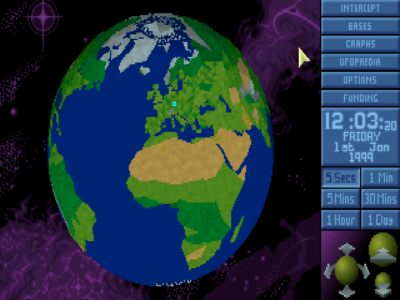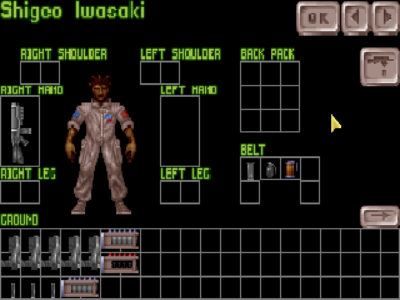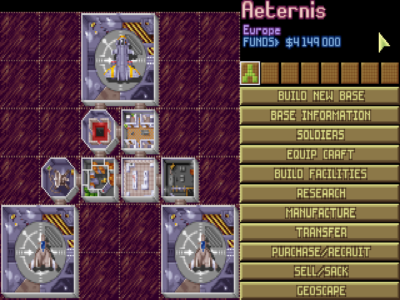
UFO: Enemy Unknown
Written by: Stoo
Date posted: July 3, 2001
- Genre: Strategy
- Developed by: Microprose
- Published by: Microprose
- Year released: 1994
- Our score: 9
Now here’s a classic from days gone by. The setting: It’s becoming apparent that extra-terrestrials are conducting a campaign of covert warfare against humanity, coming from parts unknown and carrying out lightning strikes. The military force X-Com has thus been jointly founded by the governments of earth’s nations, to tackle this threat. In your post as commander of X-com, it’s your job to direct your forces to intercept the aliens, fighting them in the air and on the ground, and learn the secrets of their advanced technology. Your assets are a few advanced aircraft, small squads of rapidly-deployable soldiers, and the finest technology and scientific minds the nations of earth can muster.
The game has two main sections. The Geoscape is a realtime display of the entire globe, and forms the hub of your directing of X-Com. From here you can select any of your bases, to take care of details like hire staff, directing research and construction, keeping an eye on your supplies and improving your facilities. When not dealing with such resource-management issues, you must oversee the movements of X-com forces, sending interceptors to shoot down UFOs, or troop transports to investigate crash sites and alien bases, or tackle alien assaults on earth’s cities.
Air-to-air action is fairly bare-bones and functional – all is you see is blips on a radar screen. Once an interceptor reaches a UFO the only options are to close for an aggressive assault, or hang back and fight more cautiously. It’s perhaps a weak point of the game; and a more detailed depiction of the action would maybe have been appreciated. Then again, it’s really just a no-frills function to cover a side of gameplay that needs to be covered for this all to make sense; the real meat of this game is in the geoscape, and the all-important tactical battles between your soldiers and aliens.
This ground combat is a separate, turn based affair viewed from an isometric perspective. As I understand it, these tactical segments were the first part of the game written, with the Geoscape added later to add large-scale strategy and a “big picture”. Your objective here is quite straightforward, i.e. neutralise all aliens. Your troops have so many points they can expend per turn in order to take certain actions, each of which have a specific points cost; a carefully aimed shot with a gun for example is much more expensive than a quick (and inaccurate) snap-shot. Other possible actions include loading a new ammo clip, arming a grenade, throwing that grenade, using a medical kit and so on. Since you also need to use up action points just to move around, this means you must balance covering ground with saving points to take action against an enemy. Each soldier has a full profile of statistics – for example strength determines how much squaddie can carry without an action-point penalty, and morale falls as you take losses and rises again if you kill foes. If it falls too much, a soldier will panic and you’ll lose control of him for that turn.
Be warned, though: at the start of the game, you’ll probably find that your soldiers are a bunch of arseholes who couldn’t hit the side of a bus from ten metres. Be prepared for shots going wide, explosive rounds missing entirely and flattening a barn and just to really wind you up, troopers occasionally shooting each other in the back of the head. Thankfully, with successive missions and experience in combat, they do improve. You can actually get quite attached to your soldiers (it’s even possible to name them yourself) as they climb from being hapless incompetents to efficient veterans. There are also tanks available – well, not full sized vehicles but rather mobile weapons platforms that provide heavy support for your soldiers. These don’t gain experience, but have the benefit of having unlimited stamina, no need for morale and immunity to psionic attacks.
Fortunately for you, the first alien species you meet are almost as bad as your lot, although their weaponry is far superior to yours. More potent varieties soon make themselves known, including the ever-irritating Chrysalids. When the psionic Ethereals turn up and start controlling the minds of your men, you’ll see a good test of your commanding abilities. So having higher quality soldiers isn’t enough to keep up with the aliens; they need better kit too and for this you need to whip your scientists into action back at base. They have a few home-grown ideas for better weapons, but later you’ll want to reverse-engineer stuff you’ve salvaged from battle. As well as using alien weaponry you’ll learn how to build battle-armour, and also improved aircraft that are a better match for the UFOs. Unlike basic rifles and grenades, this new gear can’t be bought off-the-shelf, so at this point you must either plunder what you can from the aliens, or set your own engineers to work manufacturing it.
Overall the research system serves as a means of gradually trickling new toys into the armoury of your soldiers. The first time though the game it can be quite intriguing to see what the scientists come up with on each new breakthrough – I recall that when first playing the game on a friend’s Amiga, many years ago, it was pretty exciting when the first of our new alien-tech powered interceptors rolled out of the workshop and entered service. Sad, I know, but that’s what a good strategy game does to you. Apart from technology, your resident geeks can take a look at captured aliens, and also their corpses. As well from telling you about possible strengths and weaknesses of that certain breed, you are shown a lovely picture of the corpse on a slab with its guts hanging out..
Meanwhile, within battles the AI of your foes isn’t particularly inspired. Rather than using any kind of coherent formation or tactics, the aliens prefer to skulk in shadows and take shots at whatever comes their way. Still, they are normally at least quick to respond when threatened. You will however occasionally scowl at civilians wandering around aimlessly in front of aliens (and promptly getting murdered), or worse blocking off doorways you want to get through.
Anyway while you don’t need to be a master tactician to survive the battles, some common sense and applied thought does help. For example, It certainly pays to use your men in teams – for example one providing covering fire while another advances – rather than have them rampage off on lone agendas across the map. To keep you on your toes there’s also the option of overwatch, where a soldier on one side forgoes using their action points in their own turn in order to automatically fire off a few shots at any passing enemy in their respective turn. This forces you to be cautious, as the aliens don’t hesitate to use this feature.
Looking at challenge posed on a more general scale: In the early stages of the game, money is quite tight. You have to think carefully about expensive purchases such as new bases or interceptors, bearing in mind that you also need to pay monthly for upkeep of your bases and wages to your staff. At this stage your monthly funding from about twenty nations is your main source of income. They’ll become unhappy if there’s too much alien activity in their skies and you’re not dealing with it. Of course you can’t cover the whole globe right away; your initial area of operations is fairly limited and a few nations are bound to cut funding or maybe even withdraw altogether. Fortunately you’ll soon find you can rake in far more cash flogging surplus alien technology. However, the aliens will by now be stepping up their efforts, establishing colonies all over the globe. They’ll also start assaulting your bases. You therefore need to take the fight to the aliens; if you’re failing to adequately tackle their invasion, X-Com’s bases could be destroyed, or disgruntled governments might shut down the entire organisation.
Right, rambling over. This may be be a venerable old warhorse of PC gaming, but it’s gone down in the records as one of the greats of strategy; with a good mix of management and combat, and it’s still great fun today. There’s plenty of factors to juggle in your role as commander – just the right amount of administration to give you a feel of being in proper control of the agency. Meanwhile the squad-level combat is still engaging, despite its rendition in clunky VGA. In other words, UFO still earns its place in the ranks of strategy classics, and its not inconceivable that you might waste a weekend on it.





 Posts
Posts